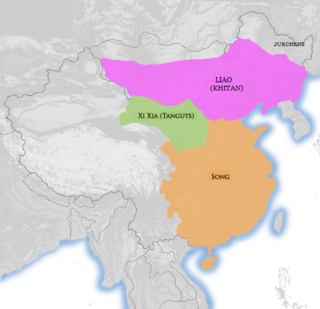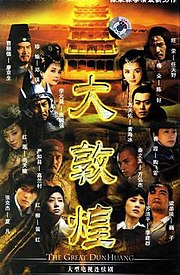
The Western Xia or the Xi Xia (Chinese: 西夏; pinyin: Xī Xià; Wade–Giles: Hsi1 Hsia4), officially the Great Xia (大夏; Dà Xià; Ta4 Hsia4), also known as the Tangut Empire, and known as Mi-nyak to the Tanguts and Tibetans, was a Tangut-led Buddhist imperial dynasty of China that existed from 1038 to 1227. At its peak, the dynasty ruled over the modern-day northwestern Chinese provinces of Ningxia, Gansu, eastern Qinghai, northern Shaanxi, northeastern Xinjiang, and southwest Inner Mongolia, and southernmost Outer Mongolia, measuring about 800,000 square kilometres (310,000 square miles).
Dynasties in Chinese history, or Chinese dynasties, were hereditary monarchical regimes that ruled over China during much of its history. From the legendary inauguration of dynastic rule by Yu the Great c. 2070 BC to the abdication of the Xuantong Emperor on 12 February 1912 in the wake of the Xinhai Revolution, China was ruled by a series of successive dynasties. Dynasties of China were not limited to those established by ethnic Han—the dominant Chinese ethnic group—and its predecessor, the Huaxia tribal confederation, but also included those founded by non-Han peoples.
Taizu is a temple name typically, but not always, used for Chinese monarchs who founded a particular dynasty. It may refer to:
The Grand Chancellor, also translated as counselor-in-chief, chancellor, chief councillor, chief minister, imperial chancellor, lieutenant chancellor and prime minister, was the highest-ranking executive official in the imperial Chinese government. The term was known by many different names throughout Chinese history, and the exact extent of the powers associated with the position fluctuated greatly, even during a particular dynasty. During the Six Dynasties period, the term denoted a number of power-holders serving as chief administrators, including zhongshun jian, zhongshu ling, shizhong, shangshu ling and puye.

Romance of the Three Kingdoms is a Chinese television series adapted from the classical 14th century novel of the same title by Luo Guanzhong. The series was produced by China Central Television (CCTV) and was first aired on the network in 1994. It spanned a total of 84 episodes, each approximately 45 minutes long. One of the most expensive television series produced at the time, the project was completed over four years and involved over 400,000 cast and crew members, including divisions of the People's Liberation Army from the Beijing, Nanjing and Chengdu military regions. Some of the dialogues spoken by characters were adapted directly from the novel. Extensive battle scenes, such as the battles of Guandu, Red Cliffs and Xiaoting, were also live-acted.

Three Kingdoms is a 2010 Chinese television series based on the events in the late Eastern Han dynasty and the Three Kingdoms period. The plot is adapted from the 14th century historical novel Romance of the Three Kingdoms and other stories about the Three Kingdoms period. Directed by Gao Xixi, the series had a budget of over 160 million RMB and took five years of pre-production work. Shooting of the series commenced in October 2008, and it was released in China in May 2010.
The Sixteen Kingdoms, less commonly the Sixteen States, was a chaotic period in Chinese history from AD 304 to 439 when northern China fragmented into a series of short-lived dynastic states. The majority of these states were founded by the "Five Barbarians", non-Han peoples who had settled in northern and western China during the preceding centuries, and had launched a series of rebellions and invasions against the Western Jin dynasty in the early 4th century. However, several of the states were founded by the Han people, and all of the states—whether ruled by Xiongnu, Xianbei, Di, Jie, Qiang, Han, or others—took on Han-style dynastic names. The states frequently fought against both one another and the Eastern Jin dynasty, which succeeded the Western Jin in 317 and ruled southern China. The period ended with the unification of northern China in 439 by the Northern Wei, a dynasty established by the Xianbei Tuoba clan. This occurred 19 years after the Eastern Jin collapsed in 420, and was replaced by the Liu Song dynasty. Following the unification of the north by Northern Wei, the Northern and Southern dynasties era of Chinese history began.

The Water Margin is a 1998 Chinese television series adapted from Shi Nai'an's classical 14th-century novel of the same title. It was produced by CCTV with Zhang Jizhong as producer. It was first broadcast in China in January 1998. The series also featured action choreography by Yuen Woo-ping.

All Men Are Brothers is a 2011 Chinese television series adapted from Shi Nai'an's 14th century novel Water Margin, one of the Four Great Classical Novels of Chinese literature. The series is directed by Kuk Kwok-leung and features cast members from mainland China, Taiwan and Hong Kong. The series was first broadcast on 8TV in March 2011 in Malaysia.

Wu Zetian is a Chinese television series based on the life of Wu Zetian, the only woman in Chinese history to assume the title of Empress Regnant and became the de facto ruler of China in the late seventh century. Directed by Chen Jialin, the series starred Liu Xiaoqing as the title character. It was first broadcast on CCTV in China in 1995 and subsequently aired by television stations in other countries.

The Patriot Yue Fei is a 2013 Chinese television series based on the life of Yue Fei, a Song dynasty general widely regarded as a patriot and national hero in Chinese culture for his role in defending the Song empire against the Jurchen campaigns. While the plot is based on historical sources, it also includes elements of fiction and draws ideas from the novel General Yue Fei (說岳全傳) and other folktales on the general's life.

Justice Bao is a Chinese TV series starring producer Jin Chao-chun as the Song dynasty official Bao Zheng. The series ran for 3 seasons from 2010 to 2012. In addition to Jin, Kenny Ho, Fan Hung-hsuan and Lung Lung again reprise their iconic roles from the 1993 Taiwanese hit Justice Pao and the 2008 Chinese series Justice Bao.

The Guiyi Circuit, also known as the Guiyi Army, Golden Mountain Kingdom of Western Han, Dunhuang Kingdom of Western Han, was a Chinese regional military command and later an autonomous dynastic regime nominally subordinate to the Tang dynasty, the Five Dynasties, and the Northern Song dynasty. The Guiyi Circuit was controlled by the Zhang family from the second half of the 9th century to the 10th century and then the Cao family until the 11th century. The Guiyi Circuit was headquartered in Shazhou.
The Legend of Crazy Monk is a Chinese television series about the life of Ji Gong. The series was directed by Lin Tianyi and based on Guo Xiaoting's classical novel Biography of Ji Gong. It was a hot TV series recently in Guangdong Television, Jiangsu Television and Shenzhen Television. It is shown on Mediacorp Channel 8 at 7pm.

The military history of the Jin dynasty and the Sixteen Kingdoms encompasses the period of Chinese military activities from 266 AD to 420 AD. The Jin dynasty is usually divided into the Western Jin and Eastern Jin in Chinese historiography. Western Jin lasted from its usurpation of Cao Wei in 266 to 316 when the Uprising of the Five Barbarians split the empire and created a number of barbarian states in the north. The Jin court relocated to Jiankang, starting the era of Eastern Jin, which ended in 420 when it was usurped by Liu Yu, who founded the Liu Song dynasty.

The Counsellors' Officeof the State Council is an advisory agency directly under the State Council of People's Republic of China. The Central Institute of Culture and History is a research institute led by the same leadership and located in the same building. They are regarded as the official government think tanks.











